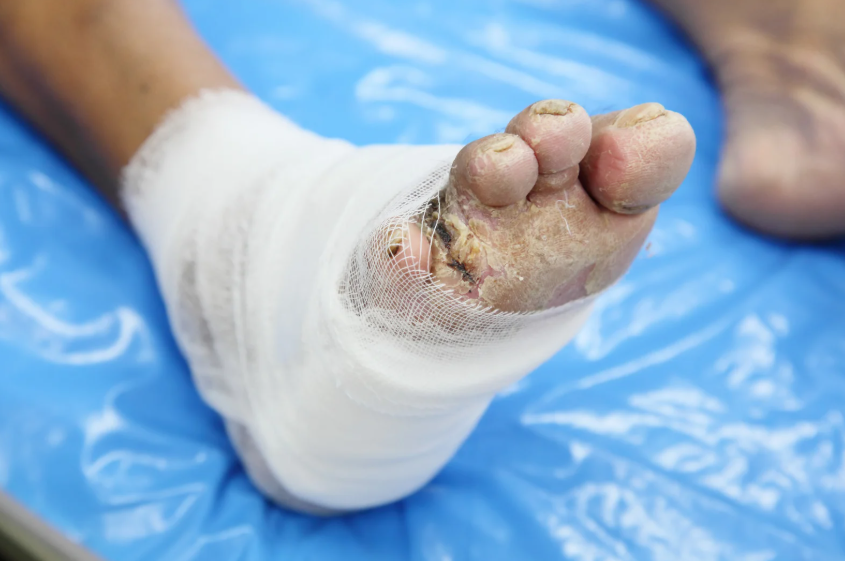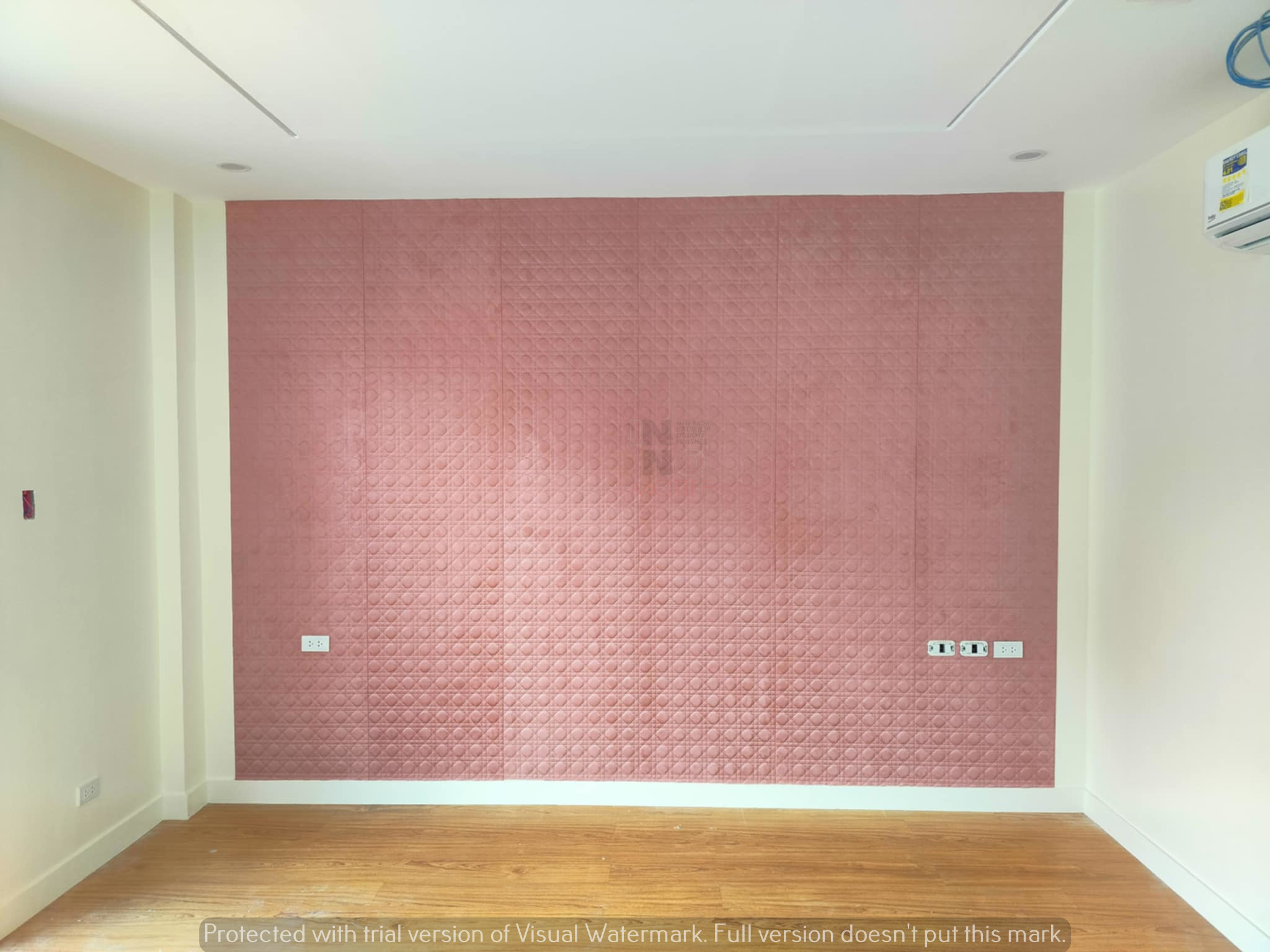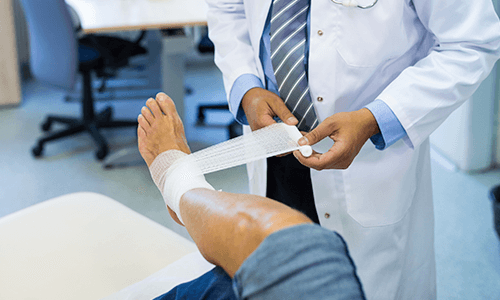Diabetic foot ulcers and pressure sores are serious wound conditions that require specialized care to heal properly. These wounds can become chronic, increasing the risk of infection, amputation, and reduced quality of life. One of the most critical steps in effective wound care is wound debridement. This medical procedure plays a vital role in clearing away dead or infected tissue, promoting healing, and reducing complications. In this blog, we explore the top benefits of wound debridement for diabetic foot ulcers and pressure sores—and why Kalingap Wound Care Clinic is the best place to receive expert care.
Understanding Diabetic Foot Ulcers and Pressure Sores
Diabetic foot ulcers occur as a result of prolonged high blood sugar, which damages nerves and blood vessels, leading to poor circulation and loss of sensation in the feet. Even minor injuries can develop into serious wounds if not properly managed. Pressure sores, also known as bedsores, result from prolonged pressure on certain areas of the body, particularly in people with limited mobility. Both types of wounds are prone to infection and slow healing if not treated promptly and correctly, highlighting the importance of professional wound debridement.
What Is Wound Debridement?
Wound debridement is the process of removing non-viable, dead, or infected tissue from a wound to support healing. This is essential for chronic wounds like diabetic foot ulcers and pressure sores, which often contain necrotic tissue that impairs recovery. There are several types of wound debridement, including surgical (sharp), autolytic (natural breakdown), enzymatic (chemical application), mechanical (physical removal), and biological (maggot therapy). The type of debridement used depends on the condition and needs of the patient. Kalingap Wound Care Clinic specializes in determining the right debridement method to ensure safe and effective results.
Removes Dead and Infected Tissue
One of the main benefits of wound debridement is its ability to eliminate dead and infected tissue from the wound site. This is crucial for diabetic foot ulcers and pressure sores, which often develop necrotic or sloughy tissue. Without removal, this tissue becomes a breeding ground for bacteria and hinders the body’s natural healing processes. By clearing this away, wound debridement performed at Kalingap Wound Care Clinic dramatically lowers the risk of infection and sets the stage for faster recovery.
Promotes Faster Healing
Wound debridement clears the wound bed, allowing new, healthy tissue to grow unimpeded. This accelerates the healing process for both diabetic foot ulcers and pressure sores. Debridement improves oxygenation, enhances blood flow, and increases the effectiveness of dressings and topical medications. Patients at Kalingap Wound Care Clinic often experience quicker recovery times because the clinic uses precise debridement techniques tailored to each wound type and patient condition.
Prevents Wound Complications
Without timely wound debridement, diabetic foot ulcers and pressure sores can worsen, leading to infections that may spread to the bone (osteomyelitis) or cause sepsis—a life-threatening condition. In severe cases, amputation may become necessary. Wound debridement removes this threat early by cleaning out harmful tissue and bacteria. At Kalingap Wound Care Clinic, experienced wound care specialists focus on preventing these complications through regular assessment and meticulous debridement procedures.
Improves Wound Assessment Accuracy
Debriding a wound not only promotes healing but also makes it easier for clinicians to evaluate the wound’s true condition. Necrotic or sloughy tissue can obscure the wound bed, making it difficult to assess size, depth, and the extent of infection. Wound debridement provides a clearer view, allowing for more accurate diagnoses and treatment adjustments. At Kalingap Wound Care Clinic, wound assessment is a priority, and debridement is performed in conjunction with thorough evaluations to guide optimal care plans.
Enhances Patient Comfort and Quality of Life
Chronic wounds can cause significant pain, odor, and discomfort. Wound debridement reduces inflammation and exudate (fluid discharge), easing the symptoms that interfere with daily life. For individuals with diabetic foot ulcers or pressure sores, this means regaining mobility and confidence. Kalingap Wound Care Clinic places a strong emphasis on patient-centered care, ensuring that debridement not only improves wound health but also enhances overall well-being.
When and How Wound Debridement Should Be Done
Wound debridement should be considered whenever a wound shows signs of delayed healing, infection, or contains dead tissue. It must be conducted by trained professionals to avoid damaging healthy tissue or worsening the condition. The specialists at Kalingap Wound Care Clinic conduct a full evaluation before recommending the most appropriate debridement technique. Their clinical expertise ensures the procedure is performed safely, effectively, and with minimal discomfort to the patient.
Wound Debridement Success: Patient Case Examples
At Kalingap Wound Care Clinic, numerous patients with diabetic foot ulcers and pressure sores have experienced positive outcomes through wound debridement. One patient with a long-standing foot ulcer saw significant improvement after three weeks of regular debridement sessions, avoiding the need for hospitalization. Another case involved a bedridden elderly patient whose pressure sore healed dramatically with enzymatic debridement combined with supportive therapy. These success stories are a testament to the importance of proper wound care.
Where to Get Professional Wound Debridement Services
Choosing the right provider is key to effective wound debridement. Look for a clinic with certified wound care specialists, modern equipment, and a reputation for compassionate service. Kalingap Wound Care Clinic in Quezon City stands out as the leading choice for wound debridement services. Their team offers expert treatment, personalized care plans, and continuous follow-up to ensure long-term healing and prevention of recurrence. Whether you’re dealing with a diabetic foot ulcer or a pressure sore, you can trust Kalingap Wound Care Clinic to deliver the highest level of care.
Takeaway
Wound debridement is a cornerstone of effective treatment for diabetic foot ulcers and pressure sores. It removes harmful tissue, promotes healing, prevents complications, and improves quality of life. By choosing professional care at Kalingap Wound Care Clinic, patients can rest assured they are receiving the best wound debridement services available in Quezon City. Don’t wait for your wound to get worse—schedule a consultation today and take the first step toward faster, safer healing.






